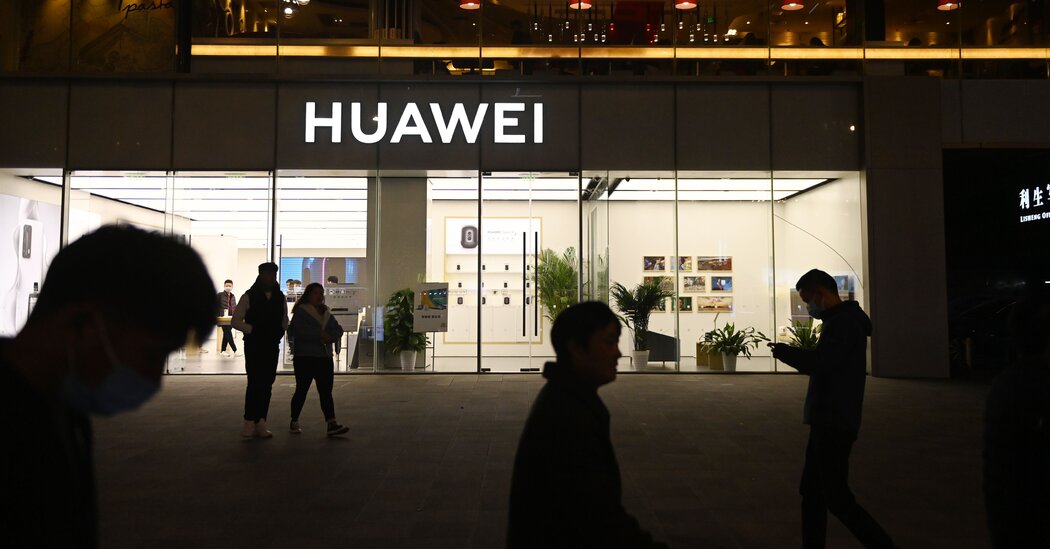Huawei, the embattled Chinese tech giant, has some slick new handsets. They’ve got the works: fast processor, glossy user interface, high-performance cameras.
The problem? Supplies might be limited.
With all the usual pomp and showmanship, Huawei on Thursday took the wraps off the Mate 40 series, the company’s first new top-of-the-line smartphones to be released since the Trump administration imposed sharp limits on its ability to buy computer chips anywhere in the world.
But the company did not say whether those restrictions would stop it from buying enough chips or other components to keep the latest phones coming. Smartphones contain a multitude of parts from different suppliers. Running out of even one of them could force Huawei to halt shipments.
Richard Yu, the head of Huawei’s consumer business, referred only briefly to the company’s travails on Thursday.
“We are in a very difficult time,” he said. On a screen behind him was an image of a rainbow with the words: “We are committed to innovate for all mankind, no matter if rain or shine.”
The Trump administration has been unswerving in its campaign to hobble Huawei, whose equipment powers telecom networks around the world. With such a blurry line separating big business and the state in China, American officials say Huawei cannot be trusted to have such a big role in the world’s information infrastructure. The company has strongly contested accusations that it threatens any nation’s security.
As the United States has enacted restriction after restriction on Huawei’s business, the company has learned to bob and weave to survive. Last year, after the Commerce Department curbed Huawei’s ability to work with American technology suppliers, the company began using more self-developed parts in its products.
Huawei’s chip division, HiSilicon, has become quite capable at designing advanced computer chips. But it still relies on outside manufacturers to produce them. That is why the Commerce Department this year dealt Huawei a heavy blow when it curtailed its ability to work with semiconductor makers like Taiwan Semiconductor Manufacturing Company, the world’s largest chip maker for hire.
Software and equipment from American companies are critical to chip making, which is why the U.S. government can exert influence over the operations of overseas manufacturers like TSMC. Before this year, Huawei had been one of the Taiwanese giant’s biggest customers, with the two companies working together to produce Huawei’s Kirin smartphone chips.
The Commerce Department’s announcement of the latest restrictions, in May, sent Huawei scrambling to stockpile chips and other components before the rules went into effect in September. The flurry of purchases helped Taiwan’s exports hit a record high in August. But TSMC’s chief executive, C.C. Wei, confirmed during a conference call with analysts last week that it was no longer shipping to Huawei.
Mr. Yu said the main chip in the Mate 40 had “5-nanometer” technology, referring to an advanced semiconductor manufacturing process that only TSMC and Samsung are capable of using at commercial scale. The chips in Apple’s latest iPhones are also made using a 5-nanometer process.
Last year’s U.S. restrictions also prevent Huawei from loading its phones with the Google Play store and other Google apps such as Gmail and Maps. Those services are already blocked in China. But their absence is a big problem in other markets.
Ben Stanton, an analyst at the research firm Canalys, said that retailers and mobile carriers outside China had been trying not to stock too many Huawei devices over the past year. “They’re extremely nervous about whether Huawei will even be in the smartphone game two or three years from now,” he said.
With people replacing their phones less often than they used to, Huawei cannot afford to look imperiled, even if the company’s top priority right now, as executives have acknowledged, is survival.
“Huawei has to project this image that it is a strong, stable company regardless of what goes on behind the scenes,” Mr. Stanton said.
People in China still support the company, many out of patriotic pride. Brisk Chinese sales helped Huawei dethrone Samsung as the world’s biggest smartphone seller in the second quarter, according to Canalys.
Handsets are not the only area of Huawei’s business facing pressure. Sweden this week barred mobile carriers from using equipment from Huawei and another Chinese supplier, ZTE, in their coming 5G networks. Britain did the same in July.
[ad_2]
Source link


